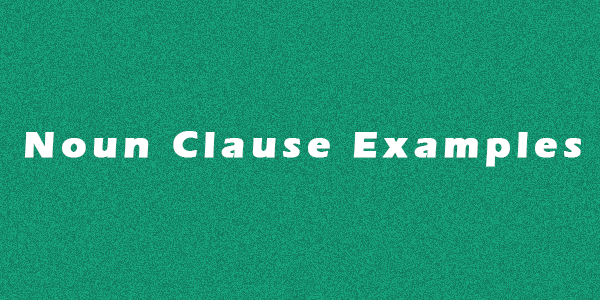Noun Clause ExamplesThe noun clause refers to the clause that fulfills the same function as a noun and is typically dependent. A noun clause, like a noun, names persons, things, places, and concepts. Noun clauses usually comprise of a verb and a subject, however they can't represent a full notion in a sentence. So they're called dependent clauses. Because noun clauses cannot be used to make full sentences, they are frequently used in conjunction with an independent clause. This article provides in-depth information about noun clauses as well as instances of noun clauses. 
How to Spot a Noun ClauseNoun clauses start with terms such as whatever, whatever, whoever, whomever, how, what, when, which, whether, whom, who, and why. Checking for such terms is thus the easiest technique to identify a noun phrase. However, it does not entail that although these terms are there in a sentence, they suggest the existence of a noun clause. They may occasionally indicate an adjective clause. For instance, the town where I reside is an excellent location for farming. Because it describes the noun "town," the clause "where I reside" in this sentence is an adjective clause rather than a noun clause. Noun clauses can function as the subject, direct object, indirect object, predicate nominative, or prepositional object. What Exactly Is a Noun Clause?A noun clause can be defined at the dependent clause in English grammar which operates as a noun (i.e., as the subject, object, or complement) within the sentences. A nominal clause is another term for it. That-clauses and wh-clauses are two typical types of noun clauses in English :
Like other nouns, a noun clause identifies individuals, places, objects, or ideas. When we wish to name anything, a single word isn't always enough; sometimes, we need a collection of words. That is why noun clauses are used. Noun Clause ExamplesHere are some of the noun clause examples with the explanation. Read on to understand them better. Noun Clause Examples #1) The emphasis of our work is on how we can best serve clients . Noun Clause Examples #2) Pick a goodie for whomever you like . Noun Clause Examples #3) Whichever eatery you select is alright with me . Noun Clause Examples #4) Be careful to appreciate whoever examined you . Noun Clause Examples #5) Do you understand what the temperature is going to be like ? (what the weather is a noun clause.) It includes the subject weather as well as the verb phrase is. In the sentence, the phrase functions as the direct object.) Noun Clause Examples #6) My most valuable asset is that I am a devoted worker. Noun Clause Examples #7) It is essential to think about why we make some choices . Noun Clause Examples #8) I ponder how long we should stand here . Noun Clause Examples #9) every time, give whichever viewers you perform for a good show . (Whichever viewer you perform for is a noun clause. It includes the subject you as well as the verb perform. In the sentence, the clause serves as an indirect object. ) Noun Clause Examples #10) Whoever thought of that notion is intelligent . Noun Clause ComponentsA subject and a verb are the two most important elements. 1. A SubjectA subject usually defines the topic of the sentence or clause . 2. A VerbA verb is a word that means "doing" or "activity. " Noun Clause FunctionsA noun clause can be both a subject and an object. Objects are classified as direct, indirect, or prepositional . 1. As a SubjectWhatever Eliza painted made me excited . How the student danced was inappropriate . 2. As an ObjectObjects are classified into three types: direct object, indirect object, and prepositional object . a)A Direct Object A verb action is delivered directly to a direct object . Do you know what the assignment involves ? My child will wear whichever clothing I give her . b) An Indirect Object An indirect object specifies the person to/for whom a verb action is performed . Always thank whichever person you serve for their good service . Make sure to send a graduation invitation to whoever educated you . c) As a Prepositional Object A noun clause is frequently followed by a prepositional object . I want to collaborate with whoever is the best at what they do . It is critical to conduct research about why some things exist . A noun clause performs the same function as a noun. It is comprises of the verb and the subject. Always find the words like whoever, why, whatever, whichever, what, how, and many more to easily identify a noun phrase in a sentence. A noun phrase can function as either a subject or an object. Prepositional objects, indirect objects, and direct objects are examples of objects . Noun clause examples with the word "that."
Noun Clause examples with "wh-words."
Noun Clause examples with "if" or "Whether"
Next TopicAdverb Clause Examples
|
 For Videos Join Our Youtube Channel: Join Now
For Videos Join Our Youtube Channel: Join Now
Feedback
- Send your Feedback to [email protected]
Help Others, Please Share









